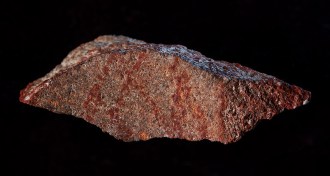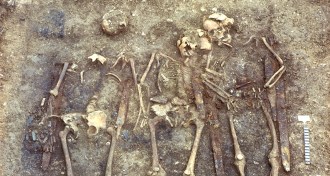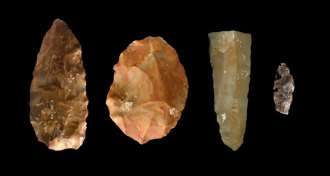
Bruce Bower has written about the behavioral sciences since 1984. He often writes about psychology, anthropology, archaeology and mental health issues. Bruce has a master's degree in psychology from Pepperdine University and a master's degree in journalism from the University of Missouri. Following an internship at Science News in 1981, he worked as a reporter at Psychiatric News, a publication of the American Psychiatric Association, until joining Science News as a staff writer. In 1996, the American Psychological Association appointed Bruce a Science Writer Fellow, with a grant to visit psychological scientists of his own choosing. Early stints as an aide in a day school for children and teenagers with severe psychological problems and as a counselor in a drug diversion center provided Bruce with a surprisingly good background for a career in science journalism.

Trustworthy journalism comes at a price.
Scientists and journalists share a core belief in questioning, observing and verifying to reach the truth. Science News reports on crucial research and discovery across science disciplines. We need your financial support to make it happen – every contribution makes a difference.
All Stories by Bruce Bower
-
 Archaeology
ArchaeologyThis South African cave stone may bear the world’s oldest drawing
The Stone Age line design could have held special meaning for its makers, a new study finds.
-
 Genetics
GeneticsGerman skeletons hint that medieval warrior groups recruited from afar
Graveyard finds may come from an ancient European warrior household with political pull.
-
 Psychology
PsychologyHuge ‘word gap’ holding back low-income children may not exist after all
The claim that poor children hear fewer words than kids from higher-income families faces a challenge.
-
 Psychology
Psychology‘Replication crisis’ spurs reforms in how science studies are done
Redos of social sciences studies from major journals point to opportunities for improvement.
-
 Anthropology
AnthropologyA fossil mistaken for a bat may shake up lemurs’ evolutionary history
On Madagascar, a type of lemur called aye-ayes may have a singular evolutionary history.
-
 Tech
TechChildren may be especially vulnerable to peer pressure from robots
Elementary school children often endorsed unanimous but inaccurate judgments made by small groups of robots.
-
 Archaeology
ArchaeologyThe debate over people’s pathway into the Americas heats up
Defenders of an ice-free inland passage for early Americans make their case.
-
 Genetics
GeneticsIndonesia’s pygmies didn’t descend from hobbits, DNA analysis suggests
Short people living on the Indonesian island of Flores don’t appear to have DNA from controversial, small-bodied Stone Age hominids called hobbits.
-
 Anthropology
AnthropologyCremated remains reveal hints of who is buried at Stonehenge
Ancient stone monument held burials of people from more than 200 kilometers away, a new study suggests.
-
 Anthropology
AnthropologyConflict reigns over the history and origins of money
Thousands of years ago, money took different forms as a means of debt payment, archaeologists and anthropologists say.
-
 Anthropology
AnthropologyHow an ancient stone money system works like cryptocurrency
Money has ancient and mysterious pedigrees that go way beyond coins.
-
 Archaeology
ArchaeologyTexas toolmakers add to the debate over who the first Americans were
Stone toolmakers inhabited Texas more than 16,000 years ago, before Clovis hunters arrived.